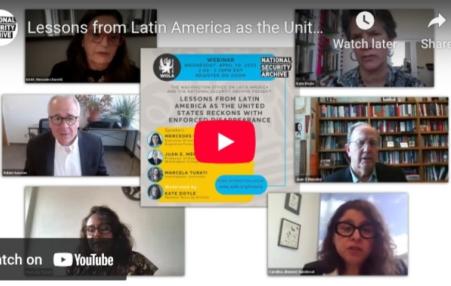Our struggle is to bring social, political, and economic justice to our nation. This is an effort of the Chicano/Mexican American Digital History Project. https://sites.google.com/site/chicanodigital/
Tuesday, May 20, 2025
The Freedom-Loving Minutemen of Massachusetts Strike Again-Immigration
Tuesday, May 13, 2025
The Disappeared: Lessons from LATIN AMERICA
|
Saturday, May 03, 2025
Federal Judge Restricts Border Patrol in California
A federal court on Tuesday issued a preliminary injunction forbidding the Border Patrol from conducting warrantless immigration stops throughout a wide swath of California.
The ruling came in response to an American Civil Liberties Union lawsuit filed after the El Centro Border Patrol traveled to Kern County to conduct a three-day sweep in January, detaining day laborers, farm workers and others in a Home Depot parking lot, outside a convenience store and along a highway between orchards.
The ruling prohibits Border Patrol agents from taking similar actions, restricting them from stopping people unless they have a reasonable suspicion that the person is in violation of U.S. immigration law. It also bars agents from carrying out warrantless arrests unless they have probable cause that the person is likely to escape before a warrant can be obtained.
“You just can’t walk up to people with brown skin and say, ‘Give me your papers,’” U.S. District Court Judge Jennifer L. Thurston said during a Monday hearing in Fresno that featured moments of heated exchange between government attorneys and the judge.
The ACLU filed suit on behalf of United Farm Workers, arguing that the stops violated the Fourth Amendment. The judge has not decided on the totality of the case, but on Tuesday granted the ACLU’s motion to stop the Border Patrol from conducting similar operations while the case moved through the courts.
“I think that it’s pretty clear that half of a century of really established law is being upheld. It’s unfortunate that this is a cause for celebration. It’s not legal to snatch people off the street for looking like farm workers or day laborers,” said Elizabeth Strater, vice president of United Farm Workers.
California Attorney General Rob Bonta agreed. “That’s existing law, and the judge’s order reflects existing law.”
“You can’t just indiscriminately stop people and search them without any appropriate reasonable suspicion or probable cause or without a warrant,” Bonta said at a news conference in San Diego on Monday about conditions in ICE detention. “So, it sounds like the judge had seen enough and wanted to issue an order. “
The injunction is in effect in the jurisdiction of California’s Eastern District, which spans the Central Valley from Redding to Bakersfield.
After the January sweep, the man who led it, Chief Patrol Agent Gregory Bovino, said his agents specifically targeted people with criminal and immigration histories. However, a CalMatters investigation revealed that the Border Patrol had no criminal or immigration history on 77 of the 78 people it arrested.
